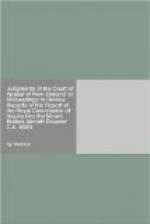Further, during the proceedings in this Court there occurred developments which in themselves threw a different light on matters dealt with in the paragraphs under attack affecting Captain Gemmell particularly. These should be publicly recorded.
It was acknowledged by all parties, including the Commissioner, that the reference to Captain Gemmell in paragraph 352, concerning a notebook belonging to Captain Collins, was a mistake. The Commissioner evidently had in mind some evidence given by Captain Crosbie, the welfare officer of the Air Line Pilots Association. This disposes of any inference against Captain Gemmell that might be taken from that paragraph.
Much the same applies to the other paragraphs affecting him which are complained of. We have set them out in full and it will be seen that they all relate to two flight bags. It had seemed that paragraph 359 (1), in its context, might have conveyed the impression that Captain Gemmell had removed these bags from the McMurdo store and brought them or their contents back from Antarctica. At our hearing, however, Mr Davison, who was one of the counsel for the Pilots Association both before the Commission and in this court, made it clear responsibly and fairly that this is not suggested.
As to Captain Eden, it has already been stated that the transcript shows that the allegation expressed or implied in paragraph 348 was never put to him. Having said so plainly, we need only add as regards this particular complaint that the allegation, although it would naturally have caused concern to Captain Eden and Air New Zealand, was not as serious as the others that are complained of.
Whether the Court has jurisdiction to quash particular passages in the report in addition to the costs order is a difficult and technical question. We prefer not to lengthen this judgment with an unnecessary discussion of it.
In modern administrative law, as a result of developments in both case and statute law, the power of the Courts to grant declarations and quash decisions is wider than was thought in the Reynolds case in 1909 (29 N.Z.L.R. at 40). It may be that in a sufficiently clear-cut case the jurisdiction, either under the Act or at common law, will be found to extend to parts of Commission reports even when they are not linked with costs orders.
But in the end that jurisdictional question does not have to be decided in this case, and we reserve our opinion on it. If the jurisdiction does go so far, it must be discretionary, as the grant of declarations always is. The Court would have to be satisfied that grounds so strong as to require it to act in that unusual way had been made out. In our opinion they would be made out clearly enough as regards paragraph 377, which stands out from the general body of the report. But the quashing of the costs order because of its association with that paragraph is enough to do justice there.




